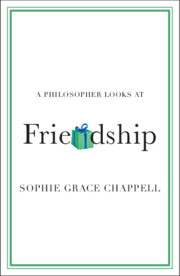A Philosopher Looks at Friendship
What is it to be a friend? What does the role of friend involve, and why? How do the obligations and prerogatives associated with that role follow on from it, and how might they mesh, or clash, with our other duties and privileges? Philosophy often treats friendship as something systematic, serious, and earnest, and much philosophical thought has gone into how 'friendship' can formally be defined. How indeed can friendship be good for us if it doesn't fit into a philosopher's neat, systematising theory of the good? For Sophie Grace Chappell, friendship is neither systematic nor earnest, yet is certainly one of the greatest goods of life. Drawing on well-known examples from popular culture, and examining these alongside recent philosophical, political, social, and theological debates, Chappell demystifies and redefines friendship as a highly untidy and many-sided good, and certainly also as one of the most central goods of human experience.
- Boldly claims that philosophy has tried to be too systematic in its approach to friendship, which is a highly untidy and many-sided good, and a central facet of human experience
- Discusses 'how friendship is good for us', even if it doesn't fit into a philosopher's systematising theory of the good
- The author is one of the foremost cotemporary voices in experiential philosophy, and has a high public profile
Product details
October 2024Paperback
9781009255547
208 pages
197 × 129 × 18 mm
0.26kg
Available
Table of Contents
- Contents
- Acknowledgements
- Prelude: eighteen aphorisms
- 1. Three friendships, and lots of questions
- 2. Philosophers of friendship: an apology
- 3. Why I don't start with a formal definition of friendship
- 4. Examples of friendship
- 5. Beginning the natural history of friendship
- 6. Deepening the natural history of friendship
- 7. Being with others
- 8. Lewis's Four Loves-and Nygren's two
- 9. Aristotle's three kinds of Philia-and Aristotle's will
- 10. Friendship, love, and second-personality
- 11. Friendship as an unemphatic good
- 12. Bertrand Russell and his over-emphatic 'German' friend
- 13. Sensitivity to tacit knowledge
- 14. Innocence
- 15. Moralism
- 16. Roles and spontaneity
- 17. The benefits of friendship
- 18. Eighteen quick questions and eighteen quick answers
- Notes
- References
- Index.



